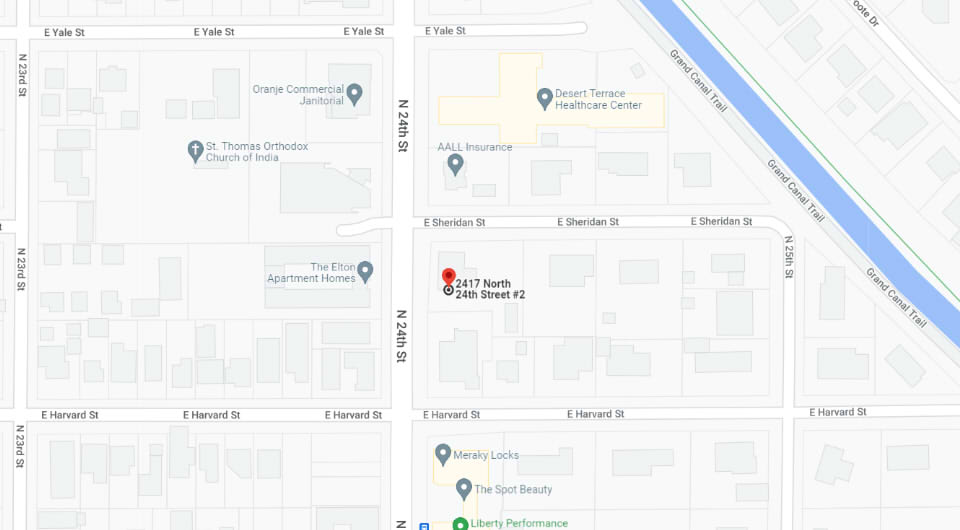When a medical specialist detects skin cancer in its early stages, it is usually treatable, and the disease poses little to no major risk to the patient's life. Skin cancer has the potential to be dangerous, but if caught and treated in its early stages, it doesn't have to be.
A delayed skin cancer diagnosis could result in a delay in its treatment. The delay could, in certain instances, cause the disease to spread throughout the body. If something like this occurred to you or a loved one, you could have grounds to claim damages on the grounds of medical malpractice.
If you or a loved one is the victim of a skin cancer misdiagnosis or failure to diagnose, the Phoenix Personal Injury Attorney Law Firm can assist you in holding the doctor responsible for negligence. Early detection is crucial, and if a doctor makes an error during diagnosis, they should be held legally responsible for any damages suffered.
Understanding Failure to Diagnose Skin Cancer in Medical Malpractice Cases
When you go to the hospital, you expect your doctor to figure out what's wrong based on your symptoms, think about every possible diagnosis that fits with those symptoms, and then do what's needed to confirm or rule out each possibility until a correct diagnosis is made. If your physician gives you the all-clear, you will know that you're healthy and don't need to take any more action.
If you saw a doctor about an abnormal mole on the skin, or maybe if you booked a screening session with your dermatologist, and the mole was missed and it ended up being precancerous, and you've since been diagnosed with late-stage skin cancer, you could have a claim for medical negligence.
Any mole that seems suspicious needs to be probed to find out if it is malignant and then extracted before cancer can spread to other parts of the body. If the doctor doesn't ask for a biopsy or misinterprets the results, this could be a sign of negligence and a failure to provide you with the necessary standard of care.
When you make an appointment to see your doctor because you are experiencing worrying symptoms, you have the right to anticipate that they'll:
- Evaluate your past medical records.
- Get the right diagnostics or imaging done.
- Pay close attention to how you describe your symptoms.
- Refer you to an expert if necessary.
While it is normal for anyone to expect a comprehensive workup of their symptoms that lead to an accurate diagnosis, our physician might not live up to your expectations. You run the risk of receiving an inaccurate or missed diagnosis if your doctor dismisses your concerns, thinks they're unimportant, or doesn't seem to be paying attention to what you're saying.
What is Failure to Diagnose?
Failure to diagnose occurs when a physician or healthcare practitioner ignores symptoms that point to a serious medical problem. Often, "failure to diagnose" denotes a medical error that disregards treating a possibly fatal illness or condition.
Examples of failure to diagnose include:
- Failure to send a patient to an expert.
- Failing to look into a possible cause of symptoms mentioned.
- Misrepresenting laboratory results.
- Failing to ask a patient about their symptoms.
- Failing to check for specific medical conditions.
You could sue your doctor for medical negligence if they misdiagnosed your illness and it got worse to a point where it was harder to treat or put your health in danger.
An experienced failure-to-diagnose lawyer in Phoenix can help you prove that your doctor did not give you the level of care you needed and deserved.
What are the Symptoms of Skin Cancer?
Sometimes, skin cancer could exist without presenting any obvious signs. This is why it's important to get regular skin screenings for skin cancer detection at an early, more treatable stage. When symptoms appear, they often include:
- The appearance of new growths on the surface of the skin, such as a pale bump or a mole.
- Changes to present moles.
- A prominent red bump.
- Skin growths or moles that bleed.
- A reddish patch on the skin that is itchy and scaly.
What Medical Errors Can Delay Skin Cancer Diagnosis?
Here are some common mistakes that doctors make that can make it take longer to find skin cancer:
- Removing growths without offering or recommending a biopsy or further tests.
- Failure to gather information regarding cancer in the family.
- Not providing or urging men as well as women at a higher risk to get timely skin cancer screenings.
- Failing to promptly refer the patient to an oncologist or dermatologist.
- Improper diagnosis of the skin cancer.
- Disregarding a suspicious growth that could turn out to be cancerous.
- Failing to appropriately monitor biopsy results.
- Errors in the pathologic analysis of tissue material.
- Lack of cooperation or communication with other healthcare professionals.
What Injuries Can The Failure To Diagnose Skin Cancer Cause?
When it comes to skin cancer, particularly melanoma, early diagnosis could be life-saving. If you wait too long to get treatment or get the wrong diagnosis, you might need surgery to remove a tumor and the tissues around it. Also, putting off treatment could lead to harsher measures like chemotherapy, radiation, or major surgery. There are situations in which the delay is of such magnitude that it is impossible to prevent an untimely death. Here are some examples of the kinds of injuries that could occur if skin cancer isn't caught early enough:
- Permanent or long-term disability.
- Premature death.
- A more intrusive, harsh, and painful course of treatment.
- A significantly longer recovery period.
- Lost income.
- A substantially more expensive course of treatment.
Why Your Doctor Could Have Missed Or Misdiagnosed A Skin Cancer
The skin cancer could have gone unnoticed or been incorrectly diagnosed as a result of these medical mistakes:
- Your doctor merely took into account your risk factors and family medical history.
- Despite your symptoms, the doctor chose not to recommend you for more testing.
- The examination failed to look into certain parts of the body, which resulted in cancer going undetected.
- You weren't made aware of the disease due to a lab mistake.
Although melanoma can be the most fatal form of skin cancer, a physician's failure to recognize a basal or carcinoma of the squamous cells could lead to surgery, disfigurement, and other issues. If skin cancer had been discovered sooner, none of these possibilities would have been taken into account.
When is Failing to Diagnose a Medical Malpractice?
When a patient in Arizona receives a treatment or diagnosis that does not reach the established standard for outstanding care in the state's medical community, this is considered medical malpractice. The term "quality of care" refers to what a generally competent physician in the same specialty would have to do for that patient or another with comparable conditions.
Misdiagnosis charges are difficult to establish, and a diagnosis mistake is not usually proof of malpractice. Such cases need a skilled failure-to-diagnose lawyer who is familiar with Arizona medical malpractice legislation.
How to Prove Medical Malpractice in a Failure to Diagnose or Misdiagnosis Claim
An attorney filing a claim for compensation due to a missed or inaccurate diagnosis must provide evidence of the following.
- A doctor-patient connection existed, establishing the responsibility to deliver the level of treatment that could be required of any fairly skilled doctor practicing in the same field or specialty.
- The doctor's failure to take all the steps a fairly competent doctor would have known to take to quickly and accurately diagnose the issue violated that acceptable level of care;
- Your health suffered significantly as a result of the doctor's failure to uphold that level of care; and
- Damages suffered by the patient were quantifiable.
There should be proof that the doctor's wrong diagnosis of the problem hurt the person's health and that the person's health would have been better off if the problem had been diagnosed quickly and correctly. If the physician conducted all of the necessary tests and screenings but the findings weren't relevant to the diagnostic test, the patient would be unable to show malpractice.
If a doctor fails to take the proper action but no injury results from it, the patient won't have a case. There could be no claim if the victim fails to report certain symptoms, provides inaccurate medical information, or fails to answer the doctor's questions honestly.
Compensation Available In A Phoenix Failure To Diagnose Claim
In a medical malpractice claim, damages are intended to reinstate the plaintiff in the situation they would've found themselves in if the incident had not taken place. Even though no money can fully fix this, people who have successfully filed a claim because their injury wasn't properly diagnosed are compensated for financial and non-financial losses.
Economic losses involve damages that have a monetary value and can be calculated. Non-economic losses involve damages that have no monetary value. They are personal and subjective to the individual. The amount of compensation given is based on the nature of the injuries, how likely it is that the person will get better, and the current and future losses.
Without a full analysis by an attorney, it's hard to know how much a failure to diagnose a claim is worth. Nonetheless, patients will often get the following forms of economic damages:
- Current and future medical expenses and surgical bills.
- Prescription fees.
- Costs related to long-term or nursing care.
- Costs of occupational and physical therapy.
- Lost earnings.
- Potential income loss.
- Costs for psychological counseling.
- Expenses associated with home or automobile modifications.
Non-economic damages could involve:
- Loss of consortium.
- Pain and suffering.
- Loss of pleasure in life.
- Disfigurement.
- Emotional and mental anguish.
Punitive damages are yet another type of compensation that a court can only award. These types of damages are intended to hold a perpetrator accountable for their actions, not necessarily to make amends to the victim.
In Arizona, punitive damages need clear and convincing proof that the accused did something horrible and that the offender did it on purpose. There is no cap on the amount of compensation that can be granted in an Arizona medical negligence claim.
Statute of Limitations for Filing a Failure to Diagnose Claim
Arizona law gives patients a certain amount of time to file a claim for a wrong diagnosis or failure to diagnose. This period lasts 2 years from the completion date of the operation that caused harm or aggravated the patient's condition.
If a condition or injury didn’t show up right away, the limitation period could be extended. The statute of limitations, in this case, would take effect on the day the condition or injury is detected or should've been detected by using reasonable care.
Always get in touch with a skilled medical malpractice lawyer to find out how long you have to file a case.
Legal Protection Against Phoenix Medical Malpractice Claims
Arizona law has restrictions on a patient's ability to sue a health maintenance organization for medical malpractice. Patients can't file a lawsuit against HMOs for suffering and pain. However, they could only seek financial damages in a federal court.
Also, a healthcare worker would not be responsible for injuries they caused to a patient in the following situations:
- If the healthcare provider swiftly expressed their displeasure and transferred the duty of handling the patient's care to another healthcare provider who was prepared to follow the agent's instructions, the provider did not follow a direction or decision that went against their conscience.
- The medical practitioner didn't speak with an incapacitated or disabled patient's surrogate if he or she could not be reached after the provider made an effort to get in touch with them, or a legitimate emergency emerged that didn't allow the medical professional enough time to find and get in touch with the surrogate.
- The physician relied on the court's ruling involving a patient.
For more details on how to take legal action against an HMO, talk to an experienced medical malpractice lawyer.
Compensation for Skin Cancer Medical Malpractice
Depending on how a missed skin cancer diagnosis hurts you, you could be able to get different kinds of compensation. If your lawyer can negotiate or win a medical malpractice case, you could be able to get several damages, such as:
- Costs of medical care.
- Costs associated with plastic surgery.
- lost income as a result of your care and treatment.
- Expenses paid for out of one's pocket.
- suffering and pain.
- Mental distress.
- Punitive damages could be awarded in some instances.
If your loved one passed away from skin cancer due to a failure to diagnose or delays in treatment, you may also be entitled to compensation for wrongful death.
Is Skin Cancer Testing And Screening Important?
Both women and men need to conduct regular self-examinations of their skin to check for any abnormalities. Knowing how your skin looks and feels might help you spot changes that might indicate malignant growth. Those who have a record of skin cancers in their family, have fair skin, or work in outdoor settings where they are frequently exposed to Ultraviolet light are encouraged to start this process sooner.
If a patient exhibits signs that raise the risk of skin cancer, a doctor is required to suggest testing. However, early cancer detection enables the detection of the disease before it spreads to other parts of the body, such as tissues and organs. When caught early enough, cancers can be removed with fewer complications using less intrusive techniques.
Those who have already been treated for skin cancer are at higher risk of developing the disease again. Patients ought to remain on the lookout, continue self-screening, and make regular medical appointments for additional screenings. Treatment for skin cancer recurrences is less effective; therefore, patients must pay attention and seek medical attention right away if there is any reason to suspect a recurrence.
Choosing a Phoenix Medical Malpractice Lawyer
Finding a qualified medical malpractice lawyer to represent you in a lawsuit involving a missed diagnosis can be a daunting task. You require legal professionals who will develop a strong case for you and keep you updated on the status of your claim as it develops.
It is crucial that you thoroughly question your prospective medical malpractice lawyer during your initial session. Ask your lawyer to share his or her knowledge and expertise in cases involving medical malpractice. Inquire as to whether or not they have dealt with cases like yours before, and what the results were in those cases.
Find out what the firm charges for services. Never sign a non-disclosure agreement without first reading it. Ensure that you are aware of any costs that you could be responsible for.
Consider whether or not you feel comfortable working with the lawyer. You'll have to be capable of speaking to your lawyer and exchanging information frequently.
Contact a Knowledgeable Phoenix Medical Malpractice Lawyer Near Me
If you or a loved one has been harmed as a result of a medical practitioner's negligence while diagnosing or failure to diagnose your skin cancer, you could receive compensation by filing a claim for medical malpractice.
Our attorneys at the Phoenix Personal Injury Attorney Law Firm have the expertise, knowledge, and means necessary to handle your claim. We serve clients throughout the Phoenix area. Call us today at 602-641-9589.










